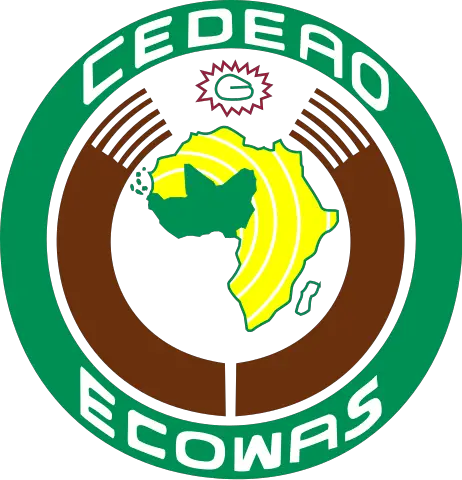- Acronym: ECOWAS
- Type: Regional Intergovernmental Organization
- Membership: 15 member states
- Establishment: Established on 28 May 1975
- Official Language(s): English, French, Portuguese
- Headquarters: Abuja, Nigeria
The Economic Community of West African States (ECOWAS) is a regional political and economic union of fifteen countries located in West Africa. Formed with the vision of fostering collective self-sufficiency, ECOWAS aims to promote economic integration across various sectors, including industry, transport, telecommunications, energy, agriculture, natural resources, commerce, monetary and financial issues, social as well as cultural matters.
Economic Community of West African States History
Established on 28 May 1975, with the signing of the Treaty of Lagos, ECOWAS was created to promote economic trade, national cooperation, and regional self-reliance, in response to the challenges of economic stability and integration in West Africa. Its mission is to create a borderless region where the population enjoys free access and expeditious movement.
Economic Community of West African States Structure
ECOWAS has several institutions implementing its policies, including:
- The Authority of Heads of State and Government: The supreme institution, directing the general policy and functioning of ECOWAS.
- The Council of Ministers: Composed of Ministers of Foreign Affairs and Finance from member states, responsible for mediation and policy direction.
- The Commission: The main executive body that implements the decisions of the Authority and the Council.
- The Community Parliament: A forum for dialogue, consultation, and consensus for representatives of the people of West Africa.
- The Economic and Social Council: A consultative assembly for dialogue between various economic and social players in member states.
- The Court of Justice: Ensures the observance of law and of the principles of equity, in the interpretation and application of the provisions of the ECOWAS Treaty and associated texts.
Economic Community of West African States Membership
Membership in ECOWAS consists of fifteen West African countries, committed to the economic integration and upliftment of the region.
Economic Community of West African States Objectives
Promote Cooperation and Integration
ECOWAS aims to foster interstate economic and industry cooperation, especially in fields of activity conducive to the development of the region.
Harmonize Agricultural Policies
Agriculture being a significant part of most member states’ economies, ECOWAS focuses on harmonizing agricultural policies and promoting free movement of agricultural products.
Ensure Peace and Stability
ECOWAS is also committed to enhancing peace, stability, and security in the region, which are prerequisites for economic development and integration.
Economic Community of West African States Funding
ECOWAS is funded through contributions from its member states. The Community Levy, a form of taxation collected from the import of goods from non-ECOWAS countries, is also a significant source of revenue.
Economic Community of West African States Projects
Infrastructure Development
ECOWAS invests in major infrastructure projects, particularly in transport and energy, to facilitate trade and movement among member states.
Common Currency
One of the long-term goals of ECOWAS is the establishment of a single currency to ensure monetary stability and to facilitate economic integration.
Peacekeeping Missions
ECOWAS has been actively involved in peacekeeping missions within the region, notably in Liberia, Sierra Leone, Guinea-Bissau, and recently in Mali and Burkina Faso.
Economic Community of West African States Members
Member States
- Benin
- Burkina Faso
- Cabo Verde
- Côte d’Ivoire
- The Gambia
- Ghana
- Guinea
- Guinea-Bissau
- Liberia
- Mali
- Niger
- Nigeria
- Senegal
- Sierra Leone
- Togo
ECOWAS continues to be a critical regional bloc in West Africa, promoting economic integration, peace, and stability. Through its policies and initiatives, ECOWAS significantly contributes to the sustainable development and economic growth of its member states, fostering a region of peace and collective prosperity.

